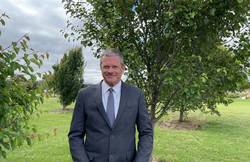
CBRE Agribusiness managing director David Goodfellow says large institutional buyers have a head start on family businesses.
The Land | 13 August 2021
Land price push from family or corporate farms
by Marian Macdonald
Is it the deep pockets of the corporates or the desperation of family farmers to seize the opportunity to buy the block next door that is pushing farmland prices to new records?
Australian family farms are keen to grow, Elders head of agribusiness investment Mark Barber said.
"Family farms have been competing most strongly for land when it comes on to the market," he said.
Record commodity prices, good seasons and low interest rates had all helped bolster earnings and asset appreciation.
"Family farms have a very positive, long-term view of the sector and, more importantly, their capacity to produce very competitive returns from the investments that they make," Mr Barber said.
The evidence, he said, was in the Farm Management Deposits (FMD) Scheme holdings, which were $6.20 billion as of 30 June 2021.
"Only individuals can hold that money in those deposits, so it's a strong indication of the strength of the sector and it's quite a war chest," Mr Barber said.
But investment in farmland by both domestic and international corporates had been strong, too.
Mr Barber pointed to Foreign Investment Review Board data showing $8.3b investments in agricultural and forestry during 2020, up from $7.3b. More than 30 per cent of the increase came from Canada.
Canadian super fund, PSP Investments, is buying up to $3 billion a year of farming assets and more than half of that is going into Australasian operations.
Large international institutions like PSP have some serious advantages over local family businesses, CBRE Agribusiness managing director David Goodfellow said.
"They've got access to very, very cheap loans offshore," he said.
"Those rates, combined with lower tax rates, for these big institutions means they can pay a lot more for that same farm."
He said a large fund could, for example, spend $36m on a farm and still pay less interest than a family business which bought the same property for $30m.
"Importantly, some of these superannuation funds have access to discounted tax rates in Australia because they've got quite sophisticated structures, it means that their tax payable is a fair bit lower as well," Mr Goodfellow said..
It all added up to a more appealing proposition for bankers.
"Even though the debt level is higher, the multiple of EBIT over interest is still much higher, so the bank is much more comfortable in that regard," he said..
All the same, it's not quite so black-and-white, Oxley Capital Partners managing director Ben Craw said. Often, foreign investment supported the upscaling of Australian family farmers.
"PSP just bought Tubbo Station down in southern New South Wales," he said.
"It's Canadian but backing the Hewitt family out of Queensland."
Most purchases, Mr Craw said, were in fact made by locals.
"Rather than a large institutional business coming in and spending $250 million dollars on an aggregation in central Queensland, the bulk of those transactions are the $20-30 million price, which is a large family, local corporate type of activity," he said.
FIRB data shows agricultural land with some foreign ownership increased 1.7pc, reaching 53.026m hectares by June 30, 2020.













